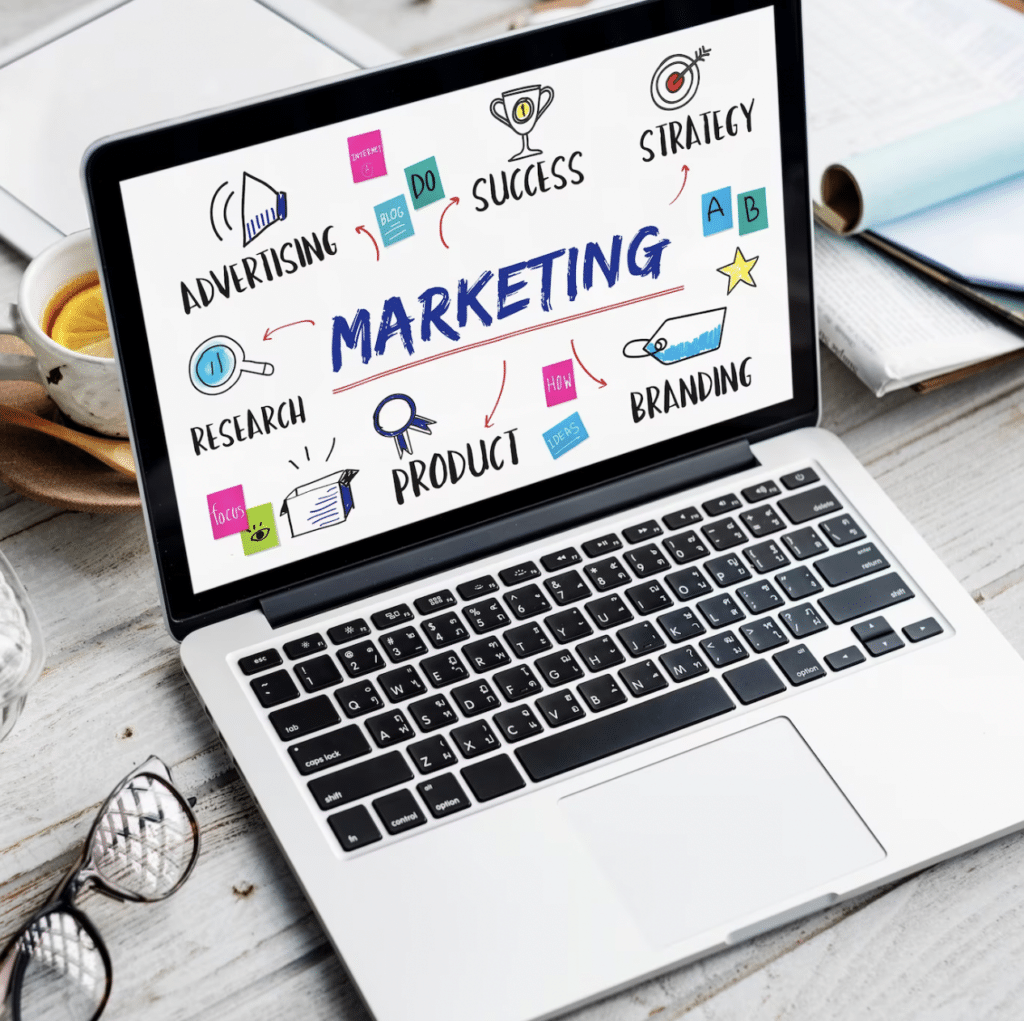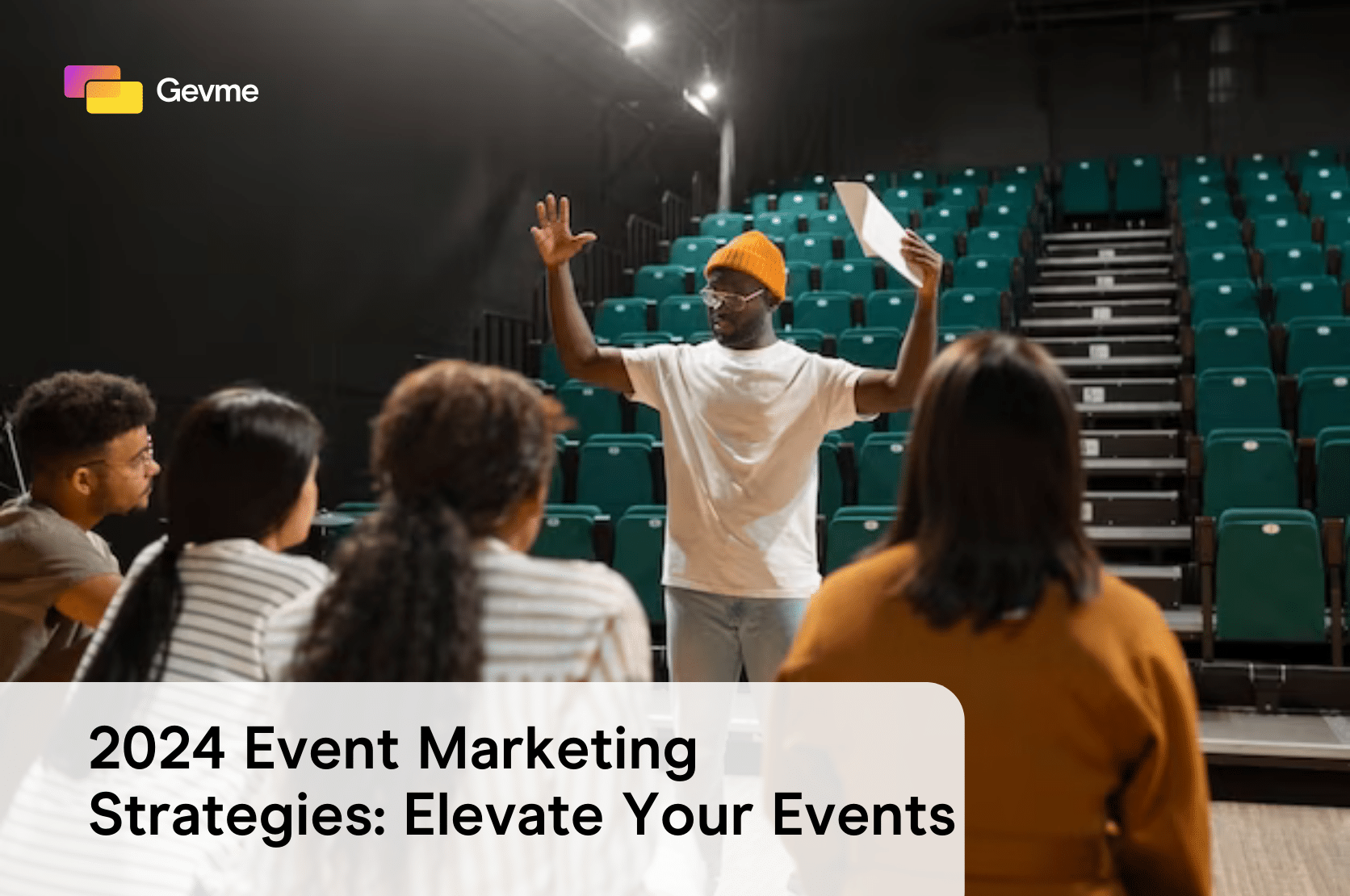As we look towards event marketing in 2024, the landscape continues to evolve rapidly, driven by technological advancements and changing attendee expectations. In this dynamic environment of event marketing in 2024, staying abreast of the latest trends and strategies is not just beneficial; it’s essential for success.
This blog will explore key strategies in event marketing for 2024, offering insights into how to effectively promote and elevate your events. From digital integration to personalized experiences and sustainable practices, we’ll delve into the approaches that are set to define event marketing in this rapidly progressing era.

Leveraging Digital Technology
The utilization of digital technology in event marketing for 2024 has become more sophisticated and integral:
- Expanding on Digital Platforms for Promotion: Beyond traditional social media, explore emerging platforms and digital channels. Tailor content to suit each platform’s unique audience and features, ensuring a broader and more effective reach.
- Deepening Social Media Marketing Tactics: Develop a comprehensive social media strategy, including regular postings, engaging with audience comments, and using platform-specific features like stories or live videos to enhance engagement and reach.
- Strategic Influencer Marketing: Collaborate with influencers for a more organic reach. This involves identifying influencers whose followers align with your target audience and crafting authentic content that resonates with their followers.
- Enhancing Email Marketing Strategies: Create segmented email lists to deliver personalized content. Use automated tools to send timely reminders, updates, and post-event surveys.
- Advanced SEO and Online Presence: Implement advanced SEO strategies, including keyword optimization, backlinking, and ensuring your website is mobile-friendly. Regularly update your content to keep it relevant and engaging.
- Creating Interactive Digital Content: Develop interactive and immersive content like virtual reality tours of event venues, augmented reality experiences, or interactive webinars to captivate potential attendees.
- Leveraging Data for Targeted Marketing: Utilize data analytics tools to gain deeper insights into your audience’s preferences and behaviors. Tailor your marketing strategies based on these insights to target potential attendees more effectively.

Personalization in Event Marketing
As we head into 2024, personalization in event marketing is becoming increasingly detailed and sophisticated:
- Tailoring Marketing to Individual Preferences: Dive deeper into attendee data to understand individual preferences. Utilize this data to craft highly personalized marketing messages, offering a unique and tailored experience for each potential attendee.
- Segmented Marketing Campaigns: Develop nuanced segmented campaigns based on detailed audience analysis. This involves creating specific content, offers, and communication strategies for different audience segments based on their demographics, interests, and behaviour.
- Personalized Communication Techniques: Enhance communication strategies by using advanced personalization techniques. This includes personalized emails, messages, and even personalized landing pages that speak directly to an individual’s preferences and past interactions.
- Behavioral Targeting in Marketing: Implement sophisticated behavioral targeting by analyzing attendees’ past actions, such as session attendance, app usage, and interaction with previous marketing materials, to predict future interests and preferences.
- Customized Event Experiences in Marketing: Market events by emphasizing the ability to offer highly customized experiences. This could include marketing personalized agendas, exclusive sessions, or unique networking opportunities that cater to individual preferences.
- Leveraging AI for Advanced Personalization: Use AI to take personalization to the next level. AI can be used to analyze large datasets to predict attendee preferences, automate personalized content delivery, and provide dynamic event suggestions.
- Feedback Loops for Enhanced Personalization: Establish robust feedback mechanisms to gather real-time insights from attendees. Use this feedback to continuously refine and personalize marketing strategies, ensuring they remain relevant and effective.

Integrating Virtual and Hybrid Event Models
The importance of virtual and hybrid models in event marketing for 2024 cannot be overstated:
- Enhanced Promotion of Virtual Components: Focus on promoting the unique advantages of virtual events, such as global accessibility, convenience, and the ability to host a diverse array of speakers and attendees from around the world.
- Customized Marketing for Hybrid Events: Tailor marketing messages to highlight the unique benefits of hybrid events, emphasizing how they combine the intimate experience of in-person interactions with the broader reach of virtual access.
- Innovative Use of Technological Tools in Promotion: Employ advanced technological tools like 3D virtual event simulations, augmented reality invitations, and engaging video content that gives a glimpse into the hybrid event experience.
- Targeted Strategies for Remote Audiences: Develop specific marketing campaigns focused on remote attendees, showcasing the virtual interactive elements, such as real-time participation in polls, virtual breakout rooms, and live-streamed keynote speeches.
- Interactive Online Marketing Techniques: Utilize interactive online marketing techniques, including virtual tours of event spaces, engaging online contests, and social media campaigns that create a buzz around the virtual components of the event.
- Promotion of Technological Innovations: Highlight the state-of-the-art technology used in these events, such as advanced live streaming quality, interactive virtual reality sessions, and AI-driven matchmaking for networking.
- Incorporating Rich Feedback and Testimonials: Leverage detailed feedback and testimonials from past virtual or hybrid events to provide prospective attendees with a clear picture of the unique experiences and benefits these formats offer.
Sustainability in Event Marketing
The focus on sustainability in event marketing for 2024 requires a multi-dimensional approach:
- Comprehensive Eco-Friendly Marketing Tactics: Extend eco-friendly marketing initiatives to include QR codes for event information, the use of sustainable inks in printing, and promotion of digital ticketing to minimize paper usage.
- Elaborate Showcasing of Sustainable Event Practices: Emphasize all aspects of sustainability in marketing, such as highlighting the use of renewable energy sources at events, waste reduction strategies, and the incorporation of local and organic food suppliers.
- Positioning Sustainability as a Core Attraction: Market sustainability as a central attraction, appealing to attendees’ growing environmental awareness and desire to support eco-friendly initiatives.
- In-depth Collaborations with Eco-Conscious Brands: Develop deeper collaborations with eco-conscious brands, including joint marketing campaigns and co-branded sustainable merchandise, to reinforce the event’s commitment to sustainability.
- Extensive Educational Content on Sustainability: Create comprehensive educational content on sustainability, such as detailed infographics on the event’s environmental impact, blog posts on sustainable practices, and interviews with sustainability experts.
- Expansive Social Media Campaigns for Eco-awareness: Develop extensive social media campaigns focused on sustainability, featuring challenges, sustainability tips related to the event, and showcasing attendee contributions to environmental initiatives.
- Detailed Reporting and Storytelling on Sustainability Efforts: Use storytelling in marketing materials to share the journey towards sustainability, including detailed reports on progress, interviews with team members responsible for sustainable practices, and behind-the-scenes looks at implementing these initiatives.

Engaging Content Strategies
In the landscape of event marketing in 2024, the richness of content strategies is key for capturing audience attention.
- Enhancing Interactive Content: Innovate with advanced interactive elements, like augmented reality invitations, virtual reality venue tours, or interactive social media campaigns that involve audience participation in shaping some aspect of the event.
- Expanding Storytelling Elements: Create in-depth stories around the event, involving narratives of past attendees, detailed speaker journeys, and the transformational aspects of the event. Use multiple platforms to tell these stories, including blogs, video diaries, and social media series.
- Broadening Multimedia Utilization: Embrace a wider range of multimedia tools, including engaging video content, thematic audio podcasts, interactive webinars, and visually rich infographics. Tailor these tools to different audience segments for maximum impact.
- Advanced AR/VR Integration: Employ AR and VR for innovative marketing experiences, like 3D virtual meet-and-greets with speakers, AR-based event maps, or VR experiences that simulate the event environment.
- Leveraging User-Generated Content More Broadly: Encourage a wide range of user-generated content, from event anticipation posts to post-event reflections. Use this content strategically in marketing to build authenticity and community.
- Intensifying Pre-Event Buzz Creation: Develop comprehensive pre-event campaigns with regular updates, countdowns, interactive Q&A sessions with speakers, and sneak peeks into exclusive event features to maintain high levels of anticipation and excitement.
- Continuous and Dynamic Content Updates: Keep potential attendees engaged with a constant flow of content, including live updates from event preparations, interactive content pieces that reveal more about the event as it approaches, and regular engagement activities.
Community Building and Engagement
Community building and engagement are crucial elements of event marketing in 2024:
- Expanding Online Community Platforms: For effective event marketing in 2024, develop dynamic online communities using various platforms, providing spaces for discussions, sharing of ideas, and building anticipation for the event. Regularly engage with these communities through content, polls, and discussions.
- Enhanced Social Media Interaction: Utilize social media platforms for more than just updates – create interactive challenges, host live Q&A sessions with speakers or organizers, and encourage attendees to share their experiences using event-specific hashtags.
- Cultivating a Shared Sense of Purpose: Emphasize the shared goals or interests that bring the community together. This could involve highlighting common challenges in the industry or shared aspirations that the event aims to address.
- Ongoing Engagement Strategies: Develop a comprehensive engagement strategy that spans before, during, and after the event. This includes teaser content, live updates during the event, and follow-up content that keeps the conversation going.
- Incorporating Feedback into Community Building: Regularly solicit and incorporate feedback from your community. This could be in the form of surveys, suggestion boxes, or interactive polls, making the community feel involved and valued.
- Hosting Diverse Virtual Networking Opportunities: Organize various virtual networking events, like thematic webinars, industry-specific discussions, or casual meet-and-greets, to facilitate connections and community building.
- Utilizing User-Generated Content to Strengthen Bonds: Encourage the community to share their experiences, stories, or expectations regarding the event. Feature this content in your marketing materials to enhance the sense of community and belonging.

Measuring and Analyzing Marketing Success
Measuring and analyzing the success of event marketing in 2024 has become more sophisticated and data-driven.
- Expanding Use of Advanced Analytics Tools: Employ a range of sophisticated analytics tools to delve deeper into KPIs. Analyze not just basic metrics like clicks and views, but also engagement depth, audience demographics, and behavioral patterns.
- Adopting Real-Time Analytics for Dynamic Adjustments: Implement real-time analytics for immediate insights during events. This allows for agile adjustments in marketing strategies, such as tweaking social media campaigns or modifying email communication in response to audience engagement.
- Comprehensive Feedback Collection and Analysis: Collect feedback through diverse channels, including post-event surveys, social media engagement, and direct attendee feedback. Analyze this data extensively to extract actionable insights for future event improvements.
- In-depth Social Media Analytics: Utilize advanced social media analytics tools to understand the nuanced impacts of different campaigns. This includes sentiment analysis, influencer impact assessment, and content engagement analysis.
- Detailed ROI Assessment Across Channels: Perform a thorough ROI assessment of various marketing channels. This involves tracking not just direct conversions but also assessing brand impact, attendee loyalty, and long-term engagement.
- Historical Data Comparison for Trend Analysis: Compare current event data with historical data to identify trends, shifts in attendee preferences, and areas of growth or decline. This historical comparison helps in strategic planning and forecasting.
- Leveraging Predictive Analytics for Strategic Planning: Use predictive analytics to forecast future trends and attendee behaviors. This forward-looking analysis can guide strategic decisions in marketing and event planning.
Future-Proofing Event Marketing
To stay ahead in 2024, event marketing strategies must be robust and adaptable:
- Embracing New Trends and Technologies: Actively explore and embrace emerging trends, be it in digital marketing, AI integration, or new social media platforms, to ensure your marketing remains cutting-edge.
- Developing Adaptive Marketing Plans: Create marketing strategies that are inherently flexible, allowing for quick pivots in response to market changes, new technological advancements, or shifts in audience behaviour.
- Encouraging a Culture of Innovation: Cultivate a work environment where creativity and innovation are valued. Encourage teams to experiment with new ideas, explore unconventional marketing channels, and think outside the box.
- Commitment to Continuous Learning: Invest in ongoing training and development programs. Keep the team updated with the latest marketing trends, tools, and best practices through workshops, webinars, and conferences.
- Cultivating Long-term Audience Engagement: Focus on strategies that build lasting relationships with your audience. This includes developing loyalty programs, engaging in community building, and providing consistent value through content and interactions.
- Proactive Market Trend Monitoring: Regularly monitor market trends and consumer behaviours. Use insights gained to anticipate shifts and adapt marketing strategies promptly to stay relevant.
- Prioritizing Sustainability and Ethical Practices: Integrate sustainability and ethical considerations into your marketing strategies. This includes using eco-friendly promotional materials, ethical advertising practices, and promoting your event’s commitment to social responsibility.
Conclusion
As we navigate the dynamic and evolving world of event marketing in 2024, it’s clear that adaptability, innovation, and a deep understanding of audience engagement are key. Employing these strategies will not only elevate your events but also ensure they resonate meaningfully with attendees. Platforms like Gevme are aligning with these trends, offering tools and insights that cater to the ever-changing landscape of event marketing. For event professionals, the future offers a realm of exciting opportunities to craft impactful and memorable events that truly stand out. The key is to approach these changes with eagerness and inventive thinking, ready to explore the vast potential of event marketing in this dynamic era.








